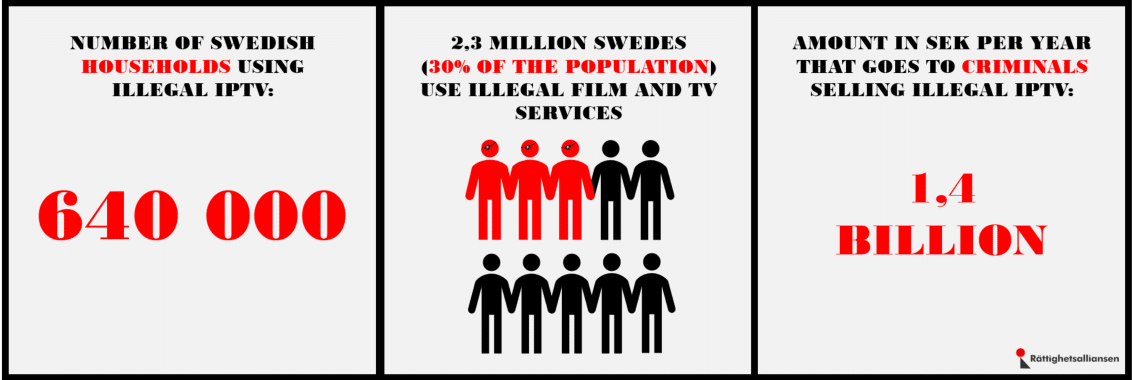 Describing Sweden as a country with a serious pirate IPTV problem is technically accurate, but lacking in all-important context.
Describing Sweden as a country with a serious pirate IPTV problem is technically accurate, but lacking in all-important context.
As a member of the European Union, Sweden is among 27 member states experiencing broadly similar difficulties. The main drivers usually boil down to lots of content being accessible from one supplier, at a price people can afford or are willing to pay.
There are variables across the bloc, from consumer demand for specific types of often expensive regional content, to rightsholders’ ability to take action, and/or convince local governments to commit scarce resources towards solving the problem.
In broad terms, the problem today is worse than it was pre-2020. No combination of industry measures, legal amendments, or government investment, has delivered anything close to a solution, anywhere in the EU. Even when positive news does arrive, it’s often met with cautious suspicion.
60,000 Swedish Households Say “No” to IPTV
Stockholm-based consulting firm Mediavision conducts regular surveys to assess consumption trends in the Nordic countries. Its report for Sweden covering several months in 2024 could hardly have been worse.
In the period bridging spring and the fall of last year, pirate IPTV subscription rates increased by a record 25%, with an estimated 700,000 households (one subscription = one household) regularly consuming from illicit sources. On face value, however, the numbers in Mediavision’s latest report seem to indicate progress.
“The use of illegal IPTV is still high and it is now estimated that 640,000 Swedish households pay for illegal IPTV services,” says anti-piracy group Rights Alliance (Rattighetsalliansen).
When a 60,000-household reduction warrants such a frosty reception (Rights Alliance says it’s too early to celebrate), the rest of the figures may not be encouraging either.
2.3 Million Swedes Use Illegal Source Every Month
The new Mediavision survey estimates that 2.3 million Swedes aged 15 to 74-years-old, consume movies, TV shows, or live sports, from illegal sources, at least every month. Sweden is a relatively small country where 2.3 million people represent 30% of the population.
Studies regularly show that infringement rates are higher among younger people; Sweden continues the long-standing trend here.
Among citizens aged 15 to 34, over half say they regularly use content from illegal sources. As expected, piracy rates are highest among younger men and when every other person is already a subscriber or regular viewer, word tends to spread especially fast.
Organized Crime
The Rights Alliance graphic below shows that another large number is also causing concern.

In 2019, the European Union Intellectual Property Office estimated that pirate IPTV services were generating close to a billion euros in annual revenue, in the EU alone (pdf). At the time, the Netherlands and Sweden had the highest percentage of IPTV users in the bloc, with 8.9% and 8.5% respectively.
To put Sweden’s pirate IPTV growth into perspective, today’s 640,000 households can be placed alongside 616,700 individuals in the six-year-old EU report. In 2018, revenue generated by pirate providers from Swedish sales was an estimated 490,000 euros.
The 1.4 billion figure above is in Swedish Krona; at today’s exchange rate that’s €137.6 million (US$154.8 million)
“1.4 billion SEK directly from Swedish households into the criminal economy is unacceptable. Organized crime is fueled, and the damages to rights holders are much bigger than this,” Rights Alliance says.
An investigation launched in Sweden a year ago is still ongoing. Alongside an assessment of financial damage to the film and TV industries, advice on whether action against IPTV subscribers is required (including a ‘ban’ on IPTV itself) is expected in the final report. Rights Alliance believes that more can be done immediately.
“There is a need for increased resources and enhanced expertise among police and prosecutors,” says Rights Alliance lawyer and former police IP crime investigator, Alma Shawwaf.
“Several actors can also do more to make it harder for criminals, not least payment providers and search engines such as Google.”
From: TF, for the latest news on copyright battles, piracy and more.
From TorrentFreak via this RSS feed

